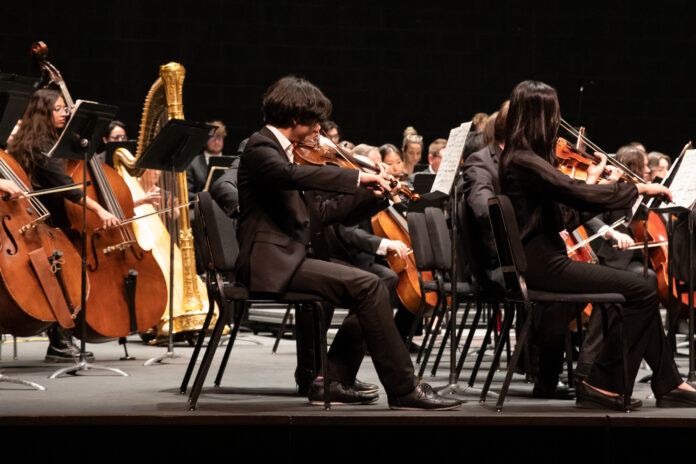Taras Krysa emerges from the darkness to take his place at the front of the stage as conductor of the Symphony Orchestra on Feb.15. Taras Krysa, Ukrainian-born, is a world-renowned and critically acclaimed conductor, previously serving as the director for orchestras all over Ukraine and America. He currently serves as the director of orchestra at UNLV.
Silence falls upon everyone in Artemus Ham Concert Hall as they hear Krysa’s opening words. The running themes of the pieces chosen surround the concept of existence, with the intention of leaving the audience pondering questions of existence themselves. Why are we here? What are we living for?
Violins, violas, cellos, and basses play a quiet, slow note, starting the first composition, Charles Ives’ The Unanswered Question. Krysa looms over the cohort of student musicians, all varying in skill and ability. Regardless of skill level, the student musicians worked tirelessly to bring this symphony to life, in only three weeks. The trumpet soloist, Barbara Hull, asks, “What do we live for?” and engages in a dialogue with the flutes, which represent humanity.
The second composition, Yevhen Stankovych’s Violin Concerto No. 5, is dedicated to Krysa’s father, Oleh Krysa. Director Krysa invites him up to the stage to play the violin and the melodies played by Oleh Krysa are meant to represent the human voice. Oleh Kyrsa’s violin is contrasted with the rest of the orchestra, representing nature’s voice. At times the human voices are in harmony with the melodies of the rest of the orchestra. At other times the voices are in conflict, but the piece ends with drums playing a repeating rhythm which is taken over by Oleh Krysa’s snapping slowly dissipating, signaling the end of the first half of the Orchestra.
After a short break for intermission, begins the final composition, Richard Strauss’ “Also Sprach Zarathustra,” which was played together without any breaks. The beginning of the piece is featured in the famous film, Stanley Kubrick’s, 2001: A Space Odyssey. Also Sprach Zarathustra inspired Thus Sprach Zarathustra, a book written by Friedrich Nietzsche, which is about self-determination, will, and the rejection of dogma. The composition contains multiple melodies that represent various motifs (human mind, nature, science and learning, light, human spirit, etc) all in conflict with each other.
According to Krysa, the most rewarding part of the performance was bringing together students of different skill levels and seeing the progress made from the first rehearsal to the final performance. Some new students have only started playing their instruments this year and some have played their instruments since childhood, however, all had a role to play in Wednesday’s performance. He says that although the performance is over, the experience that students gain will live with them for the rest of their lives.
Krysa will be heading more performances on March 29, 2023, which will include compositions by Maurice Ravel and Leoš Janáček. Another upcoming performance will be on May 7, 2023, featuring the Las Vegas Academy of the Arts, and will include compositions by Hector Berlioz and Richard Wagner.

